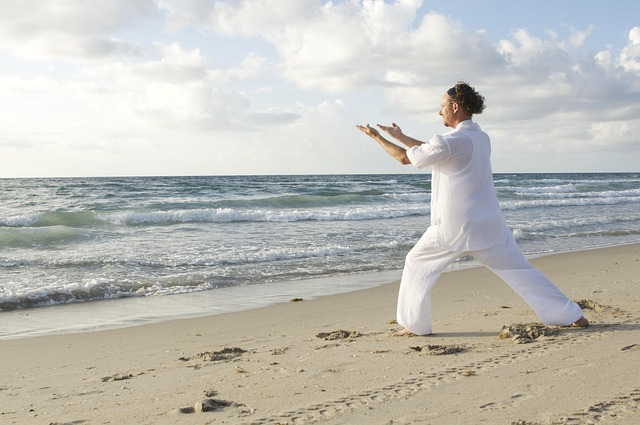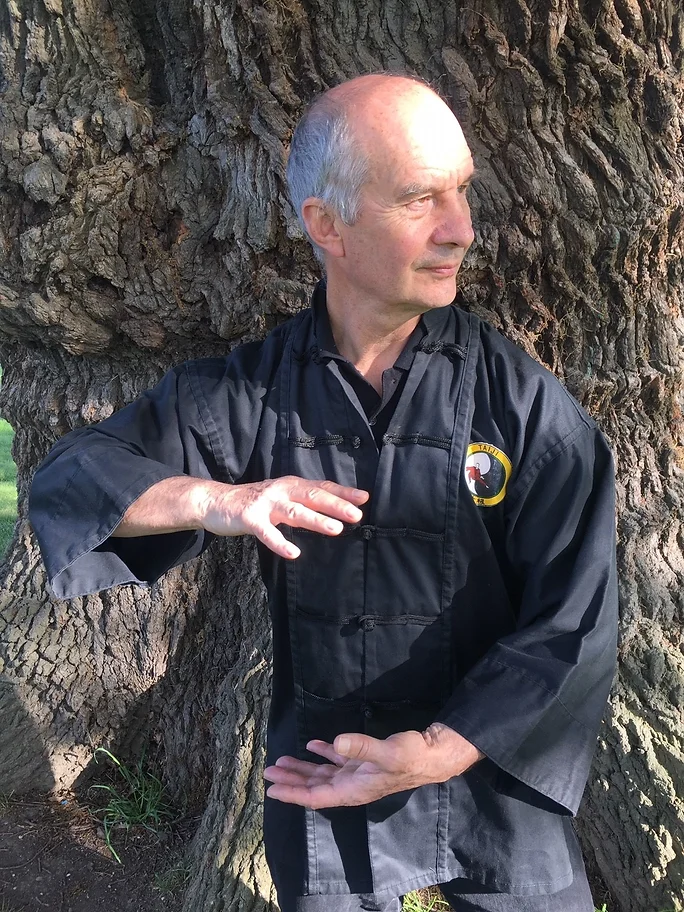Chi Kung can help our meditation as a holistic system that harmonises the flow of vital energy within the body. This blog post explores the powerful synergy between meditation and Chi Kung(Qigong) and introduces an upcoming course at the Jamyang London Buddhist Centre that promises to deepen this connection.

Understanding the Terminology: Tai Chi, Chi Kung, and Qigong
In the realm of traditional Chinese practices aimed at cultivating vital energy and promoting holistic well-being, terminology can sometimes be a source of confusion. Let’s take a moment to clarify the terms commonly used in this context.
Tai Chi: Often referred to as Tai Chi Chuan, this ancient Chinese martial art is renowned for its slow, flowing movements and emphasis on balance and internal energy cultivation. While Tai Chi has martial origins, it has evolved into a widely practiced exercise for health and meditation. The gentle, rhythmic sequences of Tai Chi forms are designed to promote the flow of chi, fostering harmony between the body and mind.
Chi Kung (Qigong): Chi Kung, sometimes spelled Qigong, is a broader term that encompasses a diverse range of Chinese exercises designed to cultivate and balance vital energy (chi or qi). Chi Kung practices may include breath control, gentle movements, and meditation. It serves as a holistic system with various styles, each focusing on different aspects of energy cultivation. The primary goal of Chi Kung is to promote the smooth flow of energy throughout the body, enhancing overall well-being.
Qigong: The term Qigong is often used interchangeably with Chi Kung and refers to the same set of practices aimed at harmonizing and enhancing the flow of vital energy. The word “Qi” means energy, and “Gong” translates to skill or cultivation. Qigong, therefore, can be understood as the skillful cultivation of energy. It is a comprehensive term that includes both dynamic and static exercises, emphasizing the integration of movement, breath, and mindfulness to facilitate the unobstructed flow of chi.
In summary, while Tai Chi is a specific form of Chinese martial art characterized by its slow, graceful movements, Chi Kung (or Qigong) is a broader category encompassing various exercises designed to cultivate and balance vital energy. Both Tai Chi and Chi Kung share the common goal of promoting harmony within the body, mind, and spirit, making them valuable practices for those seeking a holistic approach to well-being and spiritual growth.

Chi Kung for Meditators at Jamyang London with William Walker
Chi Kung (or Qi Kung in American spelling) is an ancient Chinese practise aimed at cultivating vital energy to promote health and well-being. Like meditation, Chi Kung aims to enhance the flow of energy throughout the body, fostering physical, mental, and spiritual well-being. Chi Kung helps to ground us in our bodies. Likewise, cultivating energy can help us deal with sluggish or dull feelings in our meditation and lots more.
The course “Chi Kung for Meditators” at Jamyang London will explore some of the ways Chi Kung practise can support ourselves and our meditation practise.
The course is led by experienced instructor William Walker, who explains below, all the course details.
” I remember an Iyengar Yoga teacher once telling me that from her Indian perspective a person needed to get right with their body before they attend to their minds. This, I believe, is a little unfair. For a start, to ‘get right’ with either is a lifetime work. But there is certainly truth in that Chi Kung, as a physical activity, can help our meditation. It also has a meditative side of its own that can help the energy flow better in our bodies.
Without some ‘yoga’ of the body the mind can easily become sluggish and dull on the one hand, or floaty and excited on the other. Meditation needs us to be grounded in ourselves and yet, at the same time, energised and balanced.
The three-month introductory course I am offering at Jamyang London Buddhist Centre is to foster this interdependence.
- Through providing ways to loosen and open up the body.
- Through standing Chi Kung to help align and build the energy pathways within the body.
- Through exploring The Five inter-related Elements to foster healing, balance and emotional well-being.
- Though the practise of Golden Ball Chi Kung to connect with the energy field inside and around us.
- Through mediational practise that help calm the mind, stabilise our attention in the ‘dan tien’ (or energy field). and improve our relationship with our bodies.
For existing, or would be meditators, this course will help them become more embodied, with better energy flow and better emotional balance, to help navigate the ups and downs of life. “
The upcoming course will be led by William Walker, a long-time member of Jamyang London Buddhist Centre and Chi Kung teacher.
William taught Chi Kung and Tai Chi at the centre for 25 years. In the early 90s, while living and working in Singapore he learned ‘Kong Jin Chi Kung’ under Master Xie Li. On returning to the UK in 1994 he continued his practise of Chi Kung under Master Lam Kam Chuen, becoming a long-term student and disciple. He has a wide knowledge and experience of Chi Kung, Tai Chi and Buddhism and is also qualified as a teacher of Mindfulness under the London Centre of Mindfulness.
The core of the class will be the rooting and empowering postures of Zhan Zhuang Chi Kung, ‘standing meditation’ (although the option to sit is there). These are designed to cultivate energy in the whole body making it more serviceable to meditation. The ‘lung’ or speediness in our body is replaced with ‘sung’, a relaxed yet embodied state. To help balance emotions within the body and enhance our health, some classes will include ‘Healing Sounds Chi Kung’. These relate to our internal organs and corresponding emotions and relations. There will also be a period of sitting meditation, to practise ‘sung breathing’ and ‘Golden Ball’ exercises to reduce stress and help cultivate the lower ‘dan tien’ .
All are welcome whatever your condition or fitness is. Once learned it’s a treasure for life.
Don’t miss this opportunity to integrate the wisdom of Chi Kung into your meditation practice. Act now to secure your spot in the upcoming course on Chi Kung for Meditators with William Walker. Your timely registration is crucial as we need a sufficient number of students to ensure the course’s viability. Without ample enrolment, we may regrettably have to cancel the course. Your commitment ensures the success of the course, and we look forward to sharing the enriching experience of Chi Kung with you.
Save your spot for the next course at Jamyang London Buddhist Centre Chi Kung for Meditators with William Walker.
